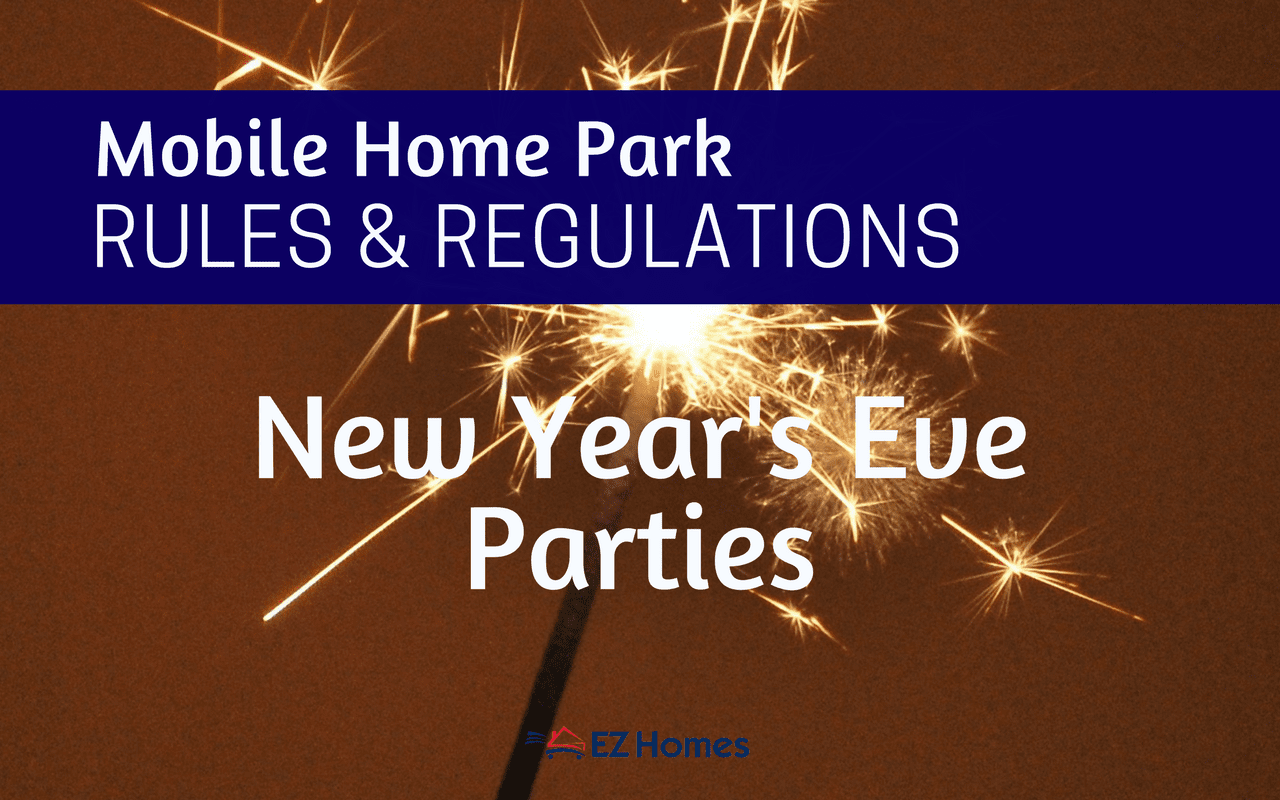No one group of people is likely so divided on the issue of New Year’s Eve as landlords. We all love to celebrate the coming of the new year with our friends and family but many landlords also deeply worry about what their tenants will get up too. What mobile home park rules and regulations should be in place so everyone can have a good time?

In this article, we would like to help you properly prepare for any eventuality so that you can focus on your own revelry this year and hopefully herald in the new year incident free.
What rules should you have in place?
First of all, we need to remind you again that your lease and rental agreement cannot overrule that of your state or local authorities, especially where it becomes a legal matter as well. We will make this clearer on the following list:
- Noise: For many, a New Year’s party is a rowdy affair where there is bound to be loud music, crackers or just loud cheering and shouting. All the residents of your park have to adhere to the local or state rules regarding what constitutes noise pollution. However, you can have your own stricter requirements, within reason. This is especially true if you have a park for senior citizens, for example.
- Damage to property: Accidents happen. This rule can change depending on whether you lease the land or the land and the home as well as any appearance standards tenants must keep their homes adhered to. These rules should clearly state a time frame within which the tenant needs to either report or fix the damage as well as who covers the costs. This could include excessive littering.
- Fireworks: Again, depending on your local state or city rules, fireworks might be banned entirely, particularly if you are close to a lot of residential housing. You should also carefully consider the rules regarding fireworks if you allow pets in your park. It’s generally not a good idea to mix pets and fireworks as the latter can be very upsetting and harmful to the former. In this case, it should be a “one or the other” approach. If you don’t allow pets and you are legally allowed to shoot fireworks, you should also carefully consider the fire risk. For this crucial reason, most parks out and out ban fireworks as mobile homes are more susceptible to this risk than stick-built homes.
Can I change the rules just before New Year’s parties?
This is a tricky one. Generally speaking, you can categorize community rules into two categories, which usually have a lot of gray area between them. There is no official term, so we will just call them “housekeeping rules” and “significant rules.”
Housekeeping rules are rules that make a slight enough difference that they would most likely not have affected the tenant’s choice to live in your community. Stuff such as the process for applying for new keys, extra security measures, as well as other timing-related tasks such as trash pickup.
These rules are more about keeping the community running smoothly and everyone living together in peace. Something that will also improve the safety of the tenants may also fall under this category such as changing the pool times or regulations.
Significant changes to rules
However, “significant rules” or those that force tenants to pay more for certain services, drastically change the way they live as well as their happiness, or that would’ve played a key role when signing the lease agreement aren’t so easy to change. The only way to change them before the end of the lease is if the tenants agree to them.
This can be problematic in a mobile home park where you can have different lengths of lease agreements that end at different times. Then again, as most rules regarding New Year’s parties impact legality as well as community members’ safety, you should be able to update the rules if they aren’t comprehensive enough. Just make sure this is within the timeframe to adopt new rules (usually 30 to 60 days depending on the state) so that they can come in to play before New Years’. Also, make sure you properly notify tenants. We’ll discuss how to do this in the next section.
Whenever you want to change the rules, you can expect some level of pushback from some of your more stubborn tenants no matter what level these rules belong to. However, the amount of control you have is drastically affected by this. This is why it’s so important to have an expert in the field help you draft lease agreements and park regulations.
For this reason, we recommend that you thoroughly plan and lay out your rules from the very beginning to avoid any such problems. You can even put in a completely separate clause which stipulates extra rules or regulations regarding the festive season and parties.
How can you remind your tenants of the rules?

- Noticeboard: The Landlord Tenant Act stipulates that it falls within the landlord’s responsibilities to have a noticeboard in the park that is accessible and visible. This noticeboard should be used to convey new information such as potential rule changes or reminders that can be put up before the festive period.
- Meetings: If you have an HOA that regularly holds meetings, this would be a good time to relate the upcoming rule changes or remind tenants of the rules. You can also call a less formal meeting to discuss these proposed rules with your tenants. Airing it in this way will allow you to receive feedback immediately as well as foster cooperation.
- Deliver notices: You can also deliver notices on a home-by-home basis. These notices can have a sign-by date. Most tenants will cooperate, which reduces the number of one-to-one outreaches you have to make. If you are just sending reminders there is obviously no need for any of that.
- Email/SMS/Whatsapp groups: If you aren’t using digital media to communicate with your tenants, you are missing out on the most efficient, inexpensive, and convenient methods to relay mass information. You should as a matter-of-course collect this information from your tenants when they sign the lease agreement.
It’s imperative that you try your best to distribute this information to your tenants in a timely manner. If tenants do disobey the rules, you can use it as proof that you did your best to inform them of regulations. Likewise, it can be used against you if you don’t.
How can you enforce the rules?
You might be wondering how you should deal with tenants once they have violated the park rules. As a mobile park owner, you are no doubt aware that whenever dealing with unruly tenants is not as easy as kicking them out on the spot.
Whenever possible, we all like to settle things amicably. Your first course of action should be to approach the infringing tenant directly, politely, and firmly, and tell them to cease what they are doing. Depending on how forgiving you are, you can either take evidence and make a record of their infringement or leave it at a verbal warning.
If you do plan on taking further action, it’s essential that you have a trail of “proof.” Lax laws in the past have led to some landlords taking advantage of their tenants. Recently, there has been more and more regulations making it harder to kick out tenants, especially unfairly.
Evictions
Eviction proceedings can also differ slightly from state to state but generally follow this pattern:
- The tenant in some way infringes on the rules of the park.
- You inform the tenant of the infringement as well as make a record with any evidence you might have. This must be done within a certain time frame (usually 1-2 months from the incident).
- If the tenant repeats the infringement within six months from the first infringement, you can then start eviction proceedings.
- The tenant has to vacate the premises within a specified period from your notice of eviction before you can proceed through the courts. If you go to court without the final eviction notice being served, it could count against you.
- In cases where the tenant fails to vacate within the period (1-2 months), court proceedings begin which could result in removing the tenant by force. If they own the mobile home, they have to carry the cost of moving it or foreclose on it.
It’s very important that you follow these proceedings and carefully stick to your local laws. Failing to do so can leave you with no further options as well as the misbehaving tenant staying put.
How to prepare for emergencies

Prevention is always better than cure. As such, there are thorough regulations in place to deal with emergencies in areas such as residential or mobile home parks. Emergencies can happen at any time. Before the holiday season might be a good time to double check that your park meets safety requirements.
Here are just some that are worth mentioning:
- All areas of the park should be accessible for emergency vehicles by road. This means no blocking branches, roads in bad condition or any other obstacles.
- The park itself should also always be accessible to emergency vehicles. That means that they should always have access or that there should be someone to give them access at any time.
- This might or might not be a requirement depending on your state, but at least one staff member should have training in first aid or fire emergencies. The park should also have relevant emergency and first aid kits.
- It might not be written in law, but it’s just good practice to keep a wary eye on your park during this time. We all want to be home and celebrating New Year’s with our own loved ones, but this is one of those times you need to take up responsibility as a park owner.
Having good mobile home park rules and regulations in place can make this a very happy new year!
New Year’s is a time for hopeful resolutions, looking forward to the future, and celebrating friends and loved ones. You don’t want to cut off your tenant’s celebrations, just make sure your mobile home park rules and regulations are fair, enforceable, and for the safety of your tenants. Furthermore, make sure you have a great manager on staff, one who understands the necessity of the rules and can handle the extra pressure of carrying them out. We wish you a happy and safe New Year!


